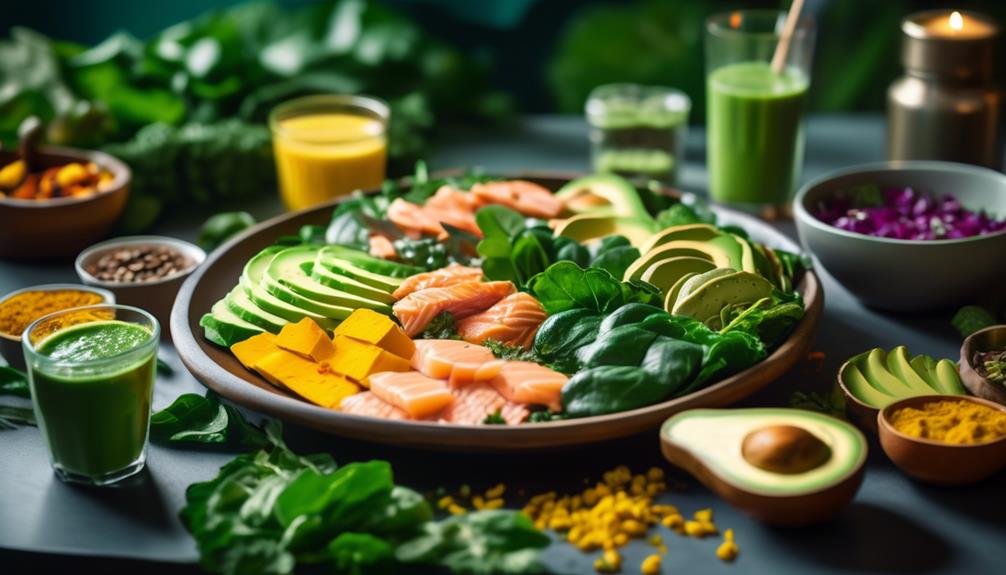Imagine waking up with a throbbing headache, feeling like a ticking time bomb about to explode. You reach for the bottle of painkillers, hoping for relief, but what if there was a more natural way to soothe the inflammation that's causing your discomfort?
Enter the ketogenic diet, a powerful tool that has gained popularity for its potential to reduce inflammation in the body. In this step-by-step guide, we will unravel the secrets of how keto can help you naturally alleviate inflammation, providing you with practical tips and strategies to embark on this transformative journey.
Curious to discover how a change in your dietary habits can bring about a world of difference?
Let's dive in.
Understanding Inflammation
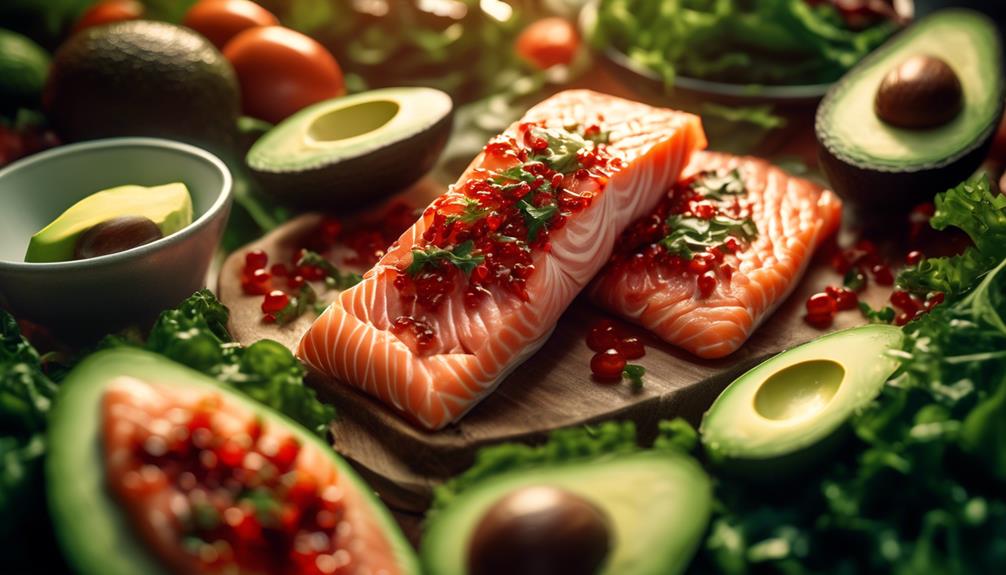
To fully understand inflammation and its impact on the body, it's crucial to delve into the intricate processes that occur within the immune system. Inflammation is a natural response by the immune system to protect the body from harmful stimuli, such as infections, injuries, or toxins. When the body detects these threats, it releases chemicals that increase blood flow to the affected area, causing redness, swelling, and heat. While inflammation is an essential part of the healing process, chronic inflammation can lead to various health problems, including heart disease, diabetes, and autoimmune disorders.
There are several causes of inflammation, including poor diet, sedentary lifestyle, stress, and exposure to environmental toxins. Certain foods, such as processed foods, sugar, and refined carbohydrates, can trigger inflammation in the body. On the other hand, incorporating natural remedies into your lifestyle can help reduce inflammation. These remedies include consuming anti-inflammatory foods like fatty fish, leafy greens, and nuts, as well as incorporating spices like turmeric and ginger into your diet. Regular exercise, stress management techniques like meditation or yoga, and getting enough sleep can also help reduce inflammation.
Understanding the causes of inflammation and implementing natural remedies can have a significant impact on reducing inflammation in the body. By making simple lifestyle changes and incorporating anti-inflammatory foods into your diet, you can promote overall health and well-being.
The Basics of the Ketogenic Diet
Now let's explore the basics of the ketogenic diet.
The keto diet involves consuming high amounts of healthy fats, moderate protein, and very low carbohydrates. By drastically reducing carb intake, your body enters a state of ketosis, where it burns fat for fuel instead of glucose.
This metabolic shift has been linked to various health benefits, including reduced inflammation.
Keto Diet Explained
Understanding the basics of the ketogenic diet can provide valuable insight into how it can help reduce inflammation.
The ketogenic diet is a low-carb, high-fat diet that focuses on consuming foods that are rich in healthy fats and limiting carbohydrates. By significantly reducing carbohydrate intake, the body enters a state called ketosis.
In ketosis, the body starts using fats as its primary source of energy instead of carbohydrates. This metabolic shift has been shown to have several health benefits. One of the major benefits is the reduction of inflammation in the body.
Inflammation is a natural response by the immune system, but chronic inflammation can lead to various health problems. The ketogenic diet has been found to reduce inflammation by regulating the production of inflammatory molecules and promoting the production of anti-inflammatory compounds.
Benefits of Ketogenic Diet
By following the ketogenic diet, you can experience a range of benefits that stem from its focus on consuming healthy fats and limiting carbohydrates.
One of the key benefits of implementing keto for weight loss is its ability to promote fat burning. When you consume a high-fat, low-carb diet, your body enters a state of ketosis, where it starts using stored fat as its primary source of fuel. This can lead to significant weight loss over time.
Additionally, the ketogenic diet has been shown to have numerous benefits for brain health. The brain requires a steady supply of glucose to function properly, but it can also use ketones for energy. This means that by following a ketogenic diet, you can provide your brain with an alternative source of fuel, which may improve cognitive function and protect against neurodegenerative diseases.
Implementing Keto for Inflammation
To effectively implement the ketogenic diet for reducing inflammation, it's important to understand the basics of this low-carb, high-fat eating plan. One key aspect of the ketogenic diet is calculating macros, which involves determining the appropriate ratio of macronutrients – fats, proteins, and carbohydrates – to consume.
Typically, the ketogenic diet emphasizes a high fat intake (around 70-75% of total calories), moderate protein consumption (around 20-25% of total calories), and very low carbohydrate intake (less than 5-10% of total calories). This macronutrient distribution helps the body enter a state of ketosis, where it primarily burns fat for fuel instead of glucose.
In addition to calculating macros, it's crucial to identify hidden inflammatory ingredients when following the ketogenic diet. Some food products may contain additives, preservatives, or artificial sweeteners that can trigger inflammation in the body. To avoid these hidden inflammatory ingredients, it's recommended to read food labels carefully and choose whole, unprocessed foods whenever possible.
Incorporating anti-inflammatory foods such as fatty fish, leafy greens, nuts, and seeds into your ketogenic diet can also help reduce inflammation and promote overall health.
Benefits of Keto for Inflammation
The ketogenic diet offers numerous benefits for reducing inflammation. Here are three key benefits of the keto diet when it comes to inflammation:
- Reduction in Joint Pain: One of the primary benefits of the keto diet is its ability to alleviate joint pain. Inflammation is often a major contributor to joint pain, and the keto diet's anti-inflammatory effects can help reduce this discomfort. By reducing inflammation in the body, the keto diet may provide relief for individuals suffering from conditions like arthritis or other joint-related issues.
- Improved Gut Health: The keto diet has also been shown to improve gut health, which plays a crucial role in managing inflammation. By reducing the intake of processed foods and carbohydrates, the keto diet promotes the growth of beneficial bacteria in the gut. This, in turn, helps to maintain a healthy gut microbiome and reduces inflammation in the digestive system.
- Balanced Blood Sugar Levels: Another advantage of the keto diet is its ability to stabilize blood sugar levels. High blood sugar levels can trigger inflammation in the body. By following a low-carbohydrate, high-fat diet, the keto diet helps regulate blood sugar levels, thereby reducing the risk of inflammation-related conditions.
Getting Started: Calculating Macros

If you're new to the ketogenic diet and want to get started, one important step is calculating your macros. Calculating macros refers to determining the specific amounts of macronutrients – carbohydrates, protein, and fat – that you should consume on a daily basis to achieve and maintain ketosis. Tracking macros is crucial because it ensures that you're following the appropriate macronutrient ratios for the ketogenic diet, which typically consists of high fat, moderate protein, and low carbohydrate intake.
To calculate your macros, you can use online calculators or consult with a healthcare professional or registered dietitian who specializes in the ketogenic diet. These tools and experts take into account factors such as your age, weight, height, activity level, and health goals to determine the appropriate macronutrient ratios for you.
Once you have your macros calculated, it's important to track your daily intake to ensure you're staying within the recommended ranges. There are various apps and websites available that make this process easier by allowing you to log your meals and track your macronutrient intake.
Stocking Your Keto Pantry
Now that you're familiar with calculating your macros, it's time to stock your keto pantry with essential staples. These items will ensure you have the necessary ingredients to create delicious and nutritious keto meals.
Essential Keto Pantry Staples
To successfully follow a keto diet, it's essential to stock your pantry with key staples that align with the principles of the ketogenic lifestyle. Here are three keto pantry essentials that can help support an anti-inflammatory diet:
- Healthy oils: Opt for oils like olive oil, avocado oil, and coconut oil, which are rich in healthy fats and have anti-inflammatory properties. These oils can be used for cooking, dressing salads, or adding flavor to your meals.
- Nuts and seeds: Almonds, walnuts, chia seeds, and flaxseeds are excellent sources of healthy fats and antioxidants. They can be used in a variety of ways, such as topping salads, adding crunch to keto-friendly baked goods, or making your own keto-friendly granola.
- Spices and herbs: Turmeric, ginger, garlic, and cinnamon are known for their anti-inflammatory properties. They not only add flavor to your dishes but also provide numerous health benefits. Incorporate them into your anti-inflammatory recipes to enhance both taste and health benefits.
Planning Your Keto Meals
When it comes to planning your keto meals, having a well-stocked keto pantry is crucial for success on the ketogenic diet. Meal prep is an essential part of the keto lifestyle, and having a variety of keto-friendly ingredients on hand makes it easier to stick to your diet and enjoy delicious meals.
Start by stocking up on staples like high-quality fats such as coconut oil, olive oil, and avocado oil. These healthy fats are essential for fueling your body and keeping you satisfied.
Don't forget to add low-carb vegetables like leafy greens, cauliflower, and broccoli to your keto pantry. These veggies aren't only nutritious but also versatile in keto-friendly recipes.
Lastly, make sure to have a good selection of proteins such as grass-fed beef, pastured poultry, and wild-caught fish. By having a well-stocked keto pantry, you'll be ready to tackle meal prep and create delicious keto meals that support your health and reduce inflammation.
Meal Planning for Inflammation Relief

Consider incorporating anti-inflammatory foods into your meal plan to help reduce inflammation. Meal planning for inflammation relief can be made easier through meal prepping and incorporating anti-inflammatory recipes. Here are three key points to keep in mind:
- Focus on whole foods: Include plenty of fruits, vegetables, lean proteins, and healthy fats in your meal plan. These foods are rich in antioxidants and anti-inflammatory compounds that can help reduce inflammation in the body.
- Include omega-3 fatty acids: Omega-3 fatty acids have been shown to have powerful anti-inflammatory effects. Incorporate foods like fatty fish (such as salmon and sardines), chia seeds, flaxseeds, and walnuts into your meals to increase your omega-3 intake.
- Limit processed foods and refined sugars: Processed foods and refined sugars can promote inflammation in the body. Avoid foods high in trans fats, such as fried foods and baked goods, as well as sugary beverages and snacks.
Top Keto-Friendly Foods for Reducing Inflammation
As you focus on reducing inflammation through your meal planning, it's important to incorporate keto-friendly foods that have been shown to have anti-inflammatory properties. These foods can help support your body's natural healing process and promote overall wellness.
When it comes to keto-friendly snack options, consider incorporating foods like avocados, which are rich in healthy fats and contain anti-inflammatory compounds such as oleic acid. Another great option is fatty fish like salmon or mackerel, which are high in omega-3 fatty acids that have been shown to reduce inflammation in the body. Nuts and seeds, such as almonds and chia seeds, are also excellent choices as they contain healthy fats and antioxidants that can help combat inflammation.
Additionally, including leafy greens like spinach and kale in your meals can provide essential nutrients and antioxidants that support a healthy inflammatory response. Meal prepping for inflammation relief can be made easier by incorporating these keto-friendly foods into your recipes and snacks. Remember to choose organic and grass-fed options whenever possible to maximize the nutritional benefits of these foods.
Avoiding Inflammatory Foods on Keto
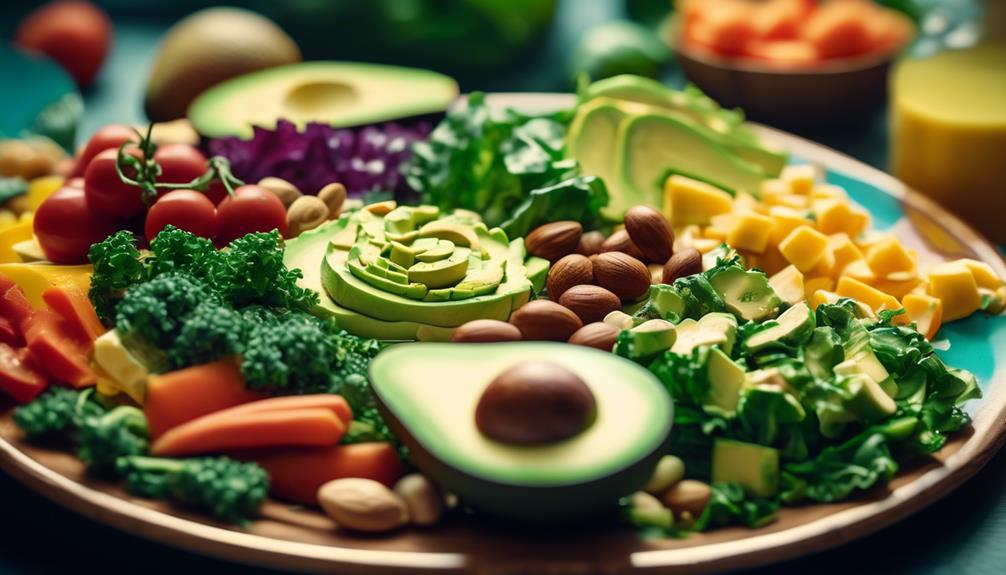
To maintain a keto diet that reduces inflammation, it's important to make mindful food choices. Opt for keto-friendly foods such as leafy greens, fatty fish, and healthy fats like avocado and olive oil.
Additionally, be vigilant in identifying hidden inflammatory ingredients like added sugars, refined grains, and vegetable oils commonly found in processed and packaged foods.
Keto-Friendly Food Choices
Choosing keto-friendly foods that are low in inflammatory properties can be beneficial for reducing inflammation on the ketogenic diet. When incorporating keto into a busy lifestyle, it's important to have convenient and nutritious options for snacks.
Here are three keto-friendly snack options that can help reduce inflammation:
- Nuts and seeds: Almonds, walnuts, chia seeds, and flaxseeds are rich in healthy fats and antioxidants that can help combat inflammation.
- Avocado: This creamy fruit is packed with monounsaturated fats, which have been shown to reduce inflammation in the body.
- Fatty fish: Salmon, mackerel, and sardines are excellent sources of omega-3 fatty acids, which have powerful anti-inflammatory effects.
Identifying Hidden Inflammatory Ingredients
To effectively avoid inflammatory foods on the keto diet, it's important to be able to identify hidden inflammatory ingredients in the foods you consume. Some ingredients may not be obvious, but they can still contribute to inflammation in the body.
One common culprit is sugar. Consuming excessive amounts of sugar has been linked to chronic inflammation. Added sugars, such as high fructose corn syrup, can be found in many processed foods, including condiments, sauces, and even seemingly healthy snacks. It's crucial to read food labels carefully and look for hidden sources of sugar.
Additionally, certain cooking oils like vegetable oil and soybean oil contain omega-6 fatty acids, which can promote inflammation when consumed in excess.
Incorporating Anti-Inflammatory Herbs and Spices
Incorporate a variety of anti-inflammatory herbs and spices into your keto diet for maximum health benefits. Adding these flavorful ingredients not only enhances the taste of your meals, but also provides numerous anti-inflammatory properties that can help reduce inflammation in your body.
Here are three essential herbs and spices to include in your keto cooking:
- Turmeric: This vibrant yellow spice contains a compound called curcumin, which has powerful anti-inflammatory effects. Studies have shown that curcumin can inhibit the activity of inflammatory enzymes and reduce the production of pro-inflammatory molecules. Add turmeric to curries, soups, or roasted vegetables to enjoy its health benefits.
- Ginger: Known for its distinct spicy flavor, ginger contains gingerol, a compound with potent anti-inflammatory properties. Research suggests that ginger can help alleviate symptoms of inflammation-related conditions like osteoarthritis and rheumatoid arthritis. Incorporate fresh ginger into stir-fries, salads, or brew it into a calming tea.
- Cinnamon: This aromatic spice not only adds warmth to your dishes but also possesses anti-inflammatory properties. Cinnamon contains compounds that can inhibit the release of inflammatory substances in the body. Sprinkle cinnamon on your keto-friendly desserts or add it to your morning coffee for a delightful and anti-inflammatory boost.
Hydration and Inflammation

To reduce inflammation, it's important to prioritize hydration. Water plays a crucial role in maintaining overall health and can help alleviate inflammation in the body.
Dehydration, on the other hand, can contribute to increased inflammation and worsen symptoms. By staying properly hydrated, you can support joint health and reduce inflammation in your body.
Water and Inflammation
Staying properly hydrated is crucial for reducing inflammation and promoting overall health on the keto diet. When it comes to water and inflammation, there are two important aspects to consider: water's impact on gut health and its effect on skin inflammation.
Here's what you need to know:
- Water and gut health: Drinking an adequate amount of water helps maintain a healthy gut. It aids in digestion, nutrient absorption, and waste elimination, which can reduce gut inflammation and promote a balanced gut microbiome.
- Water and skin inflammation: Dehydration can lead to dry skin, which is more prone to inflammation and irritation. By staying hydrated, you can help maintain proper skin hydration, reduce skin inflammation, and support a healthy skin barrier.
Remember to drink water throughout the day to ensure optimal hydration and support your body's natural inflammatory response.
Dehydration and Inflammation
Proper hydration is essential for reducing inflammation and maintaining optimal health on the keto diet. Dehydration can lead to a variety of health issues, including an increased risk of inflammation. When your body is dehydrated, it produces more histamine, a chemical that triggers inflammation.
Additionally, dehydration can affect the production and function of cytokines, which are proteins involved in the inflammatory response. To prevent dehydration and reduce inflammation, it's important to drink an adequate amount of water throughout the day.
Aim for at least eight glasses of water daily, and increase your intake if you're physically active or live in a hot climate. Remember that other fluids, such as herbal tea or infused water, can also contribute to your hydration goals.
Hydration and Joint Health
Maintaining proper hydration is crucial not only for reducing inflammation, but also for promoting joint health on the keto diet. When you follow a low-carb, high-fat diet like keto, it's important to pay attention to your water intake to ensure optimal joint mobility.
Here are three reasons why hydration is essential for joint health:
- Lubrication: Water acts as a lubricant for your joints, helping to reduce friction and improve joint mobility. Staying hydrated ensures that your joints have enough fluid to function properly.
- Nutrient delivery: Water helps transport essential nutrients to your joints, aiding in tissue repair and reducing inflammation. Proper hydration ensures that your joints receive the necessary nutrients to maintain their health.
- Waste removal: Adequate hydration helps flush out waste products and toxins from your joints, preventing the build-up of inflammatory substances. This can help reduce inflammation and promote overall joint health.
Remember to drink enough water throughout the day to support joint health and optimize your keto journey.
Intermittent Fasting and Inflammation

Intermittent fasting can effectively reduce inflammation in the body, according to evidence-based research. This fasting pattern involves cycling between periods of eating and fasting, and it has been shown to have numerous health benefits. One of these benefits is its ability to reduce inflammation.
When you follow an intermittent fasting schedule, your body goes through periods of not eating, which allows it to enter a state of ketosis. During ketosis, your body starts using stored fat as its primary source of energy instead of glucose. This metabolic shift has been found to have anti-inflammatory effects in the body.
Studies have shown that intermittent fasting can reduce inflammation markers such as C-reactive protein (CRP) and interleukin-6 (IL-6). These markers are associated with chronic inflammation, which is linked to various health conditions such as heart disease, diabetes, and obesity.
Additionally, intermittent fasting can also improve insulin sensitivity, which can further reduce inflammation. By regulating blood sugar levels and reducing insulin resistance, intermittent fasting helps to lower inflammation levels in the body.
Tracking Progress: Using Metrics and Measurements
To effectively track your progress and measure the impact of reducing inflammation with keto, it's important to utilize various metrics and measurements. By using body composition analysis and measuring inflammation levels, you can gain valuable insights into how your body is responding to the ketogenic diet. Here are three key metrics to consider:
- Body composition analysis: This involves measuring your body fat percentage, muscle mass, and overall weight. Keto can lead to significant changes in body composition, such as increased fat loss and preservation of lean muscle mass. Regularly tracking these measurements can help you gauge the effectiveness of your ketogenic diet in reducing inflammation.
- Inflammation markers: Measuring inflammation levels through blood tests can provide valuable information on the impact of keto on your body's inflammatory response. Key markers to monitor include C-reactive protein (CRP), interleukin-6 (IL-6), and tumor necrosis factor-alpha (TNF-alpha). Lower levels of these markers indicate reduced inflammation and improved health.
- Energy levels and subjective well-being: While not directly measurable, keeping a record of your energy levels, mood, and overall well-being can give you a subjective assessment of how the ketogenic diet is affecting your inflammation levels. Reduced fatigue, improved mental clarity, and enhanced mood are commonly reported benefits of keto that may indicate a reduction in inflammation.
Adjusting Keto for Individual Needs
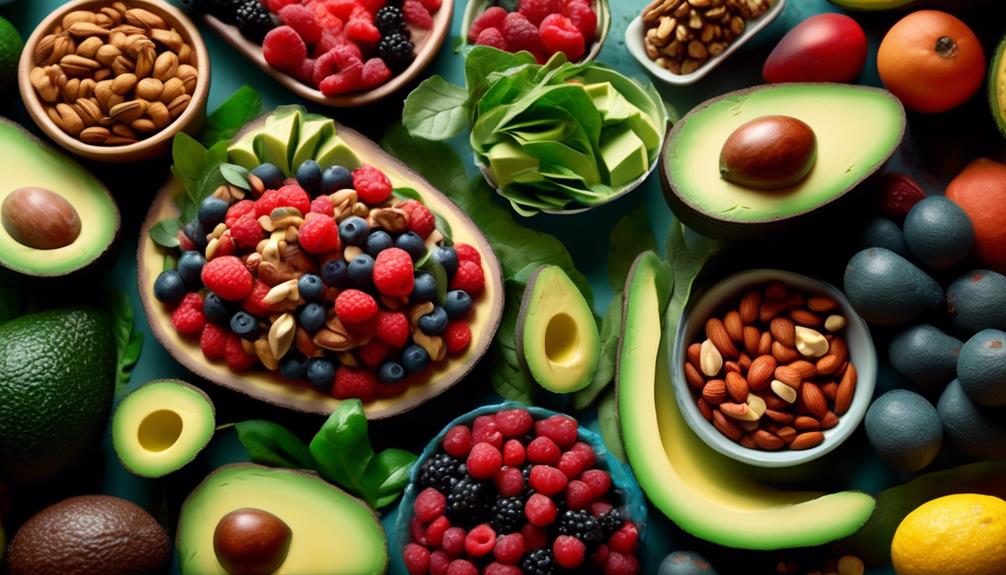
To effectively tailor the ketogenic diet to your individual needs, it's important to determine the optimal macros and adjust your meal plan accordingly. Adjusting macros involves finding the right balance of macronutrients – fat, protein, and carbohydrates – that works best for your body and health goals.
While the standard macronutrient ratio for keto is typically 75% fat, 20% protein, and 5% carbohydrates, individual needs may vary.
A personalized approach to adjusting macros takes into account factors such as age, sex, activity level, health conditions, and weight loss goals. For example, if you're physically active and engage in intense workouts, you may need to increase your protein intake to support muscle repair and recovery. On the other hand, if weight loss is your primary goal, you may benefit from slightly reducing your fat intake to create a larger calorie deficit.
To adjust your macros, start by tracking your food intake and monitoring how your body responds. Experiment with different ratios and observe how you feel, your energy levels, and your progress towards your health goals. It's important to remember that finding the optimal macros is a process of trial and error, and what works for one person may not work for another.
Stay flexible and be willing to make adjustments along the way to optimize your results.
Staying Consistent: Tips for Long-Term Success
Consistency is key to achieving long-term success on the ketogenic diet. To stay consistent and maintain motivation, it's important to implement a few strategies.
Here are three tips to help you track your progress and stay motivated:
- Keep a Food Journal: Tracking your food intake can help you stay accountable and ensure you're sticking to your ketogenic goals. Write down what you eat, including portion sizes and macronutrient breakdowns. This journal can also serve as a reference to identify any patterns or triggers that may affect your progress.
- Monitor Your Body Composition: Instead of solely relying on the scale, track your progress by measuring changes in your body composition. Use methods like body fat percentage measurements, progress photos, or waist circumference measurements. This allows you to see changes in your body composition, even if the number on the scale doesn't budge.
- Set Realistic Goals and Celebrate Milestones: Break your long-term goals into smaller, achievable milestones. Celebrate these milestones along the way to stay motivated. Reward yourself with non-food-related treats, such as a massage or a new workout outfit. Recognizing and celebrating your progress will help you stay focused and motivated in the long run.
Combining Keto With Other Natural Anti-Inflammatory Methods
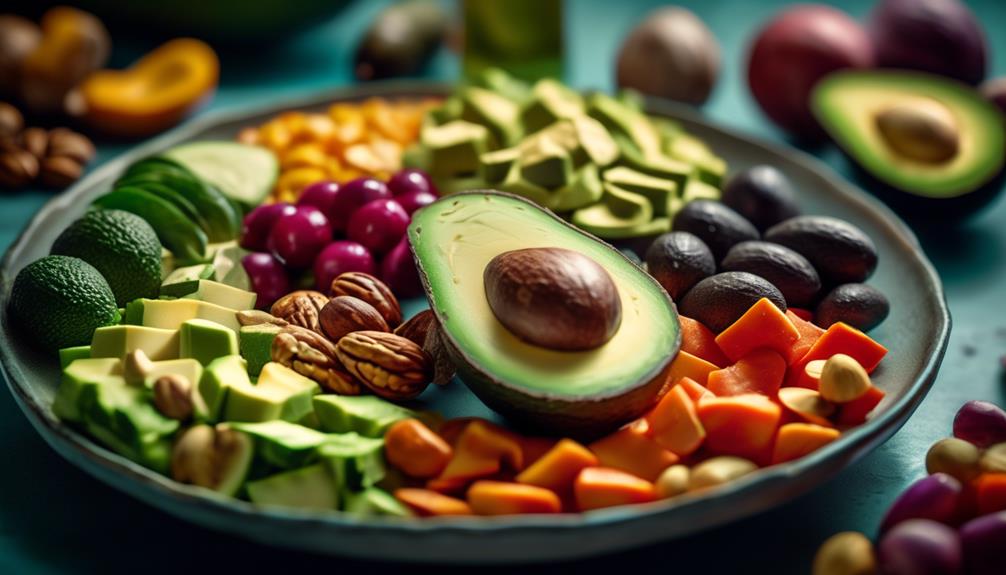
When it comes to reducing inflammation, combining the ketogenic diet with other natural anti-inflammatory methods can be highly beneficial.
In addition to following the high-fat, low-carb keto diet, incorporating anti-inflammatory supplements and alternative methods can help further reduce inflammation in your body.
One option to consider is the use of anti-inflammatory supplements. These supplements contain natural ingredients that have been shown to have anti-inflammatory properties. Some commonly used supplements include omega-3 fatty acids, turmeric, ginger, and green tea extract. These supplements can help reduce inflammation and provide additional support to your body's natural healing processes.
In addition to supplements, there are alternative anti-inflammatory methods you can try. These include acupuncture, massage therapy, and yoga. Acupuncture involves the insertion of thin needles into specific points on the body to stimulate energy flow and promote healing. Massage therapy can help relax muscles and reduce tension, which can alleviate inflammation. Yoga combines stretching, breathing, and meditation to promote overall health and reduce inflammation.
Conclusion
By following the step-by-step guide to naturally reduce inflammation with the ketogenic diet, you can take control of your health and well-being.
Combining the benefits of keto with other natural anti-inflammatory methods will empower you to combat inflammation and promote overall wellness.
With careful macro calculation, a well-stocked pantry, and consistent tracking of progress, you can achieve long-term success on your journey to reducing inflammation.
Take charge of your health today and embrace the power of the ketogenic diet.

